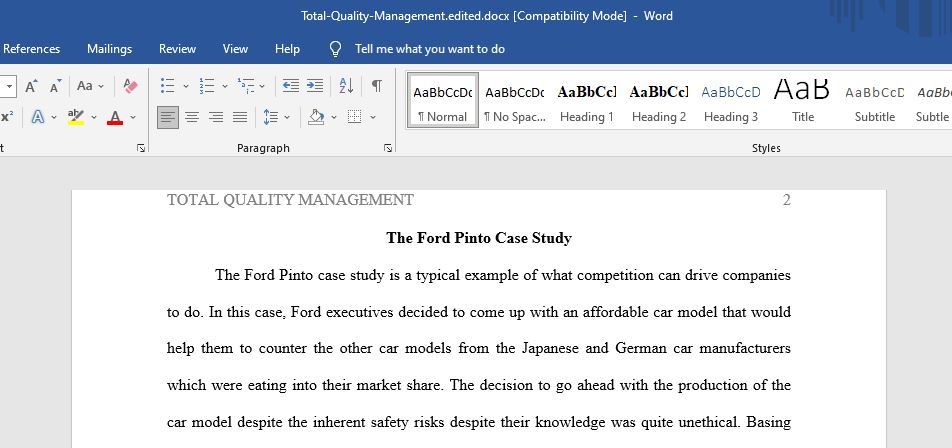Total Quality Management
Ford was heavily criticized for quantifying external costs the way it did. Do you think companies do things differently today? Provide examples if you think there are. Are there other more practical alternatives that are also more ethical? Again examples will be great.
Response (1) :
I remember reading about the Ford Pinto example when studying Customer Social Responsibility and in my personal life sharing an automobile hobby with my dad. Reading about it now in case studies allows us to see the black and white on paper of what the decisions were, what actions were made, and the consequences that resulted. I’m sure that in the moment, these facts were not as black and white and, of course, no one knew for certain as to the outcomes that would occur. However, I do agree that Ford did not properly do it’s customers ethical service by rolling out the vehicle knowingly aware of the defects and issues that could and would occur. I think that in today’s industry, consumers are muchmore aware and demanding in what they want and how they want it. Consumer Reports publishes plenty of research articles and data that breakdown multiple industries, the automobile industry being one of them, and consumers are giving the transparency of data points such as safety. My parents did this when searching for new cars when we were children and they continued to do this while researching used cars for my sister and I. I think that with time comes more intelligence, technology, and advancements in safety and today’s vehicles are much better equipped than the Pinto was. I also believe that Ford did not withhold their CSR by allowing the production of the Pinto to occur and also to continue for 6 more years without offering a viable, safe alternative for consumers. Ford was ignorant in their cost/benefit analysis and ended up having to pay, quite literally, for it when consumer lawsuits and damages were quantified. If they made the simple changes in production, I believe that their costs and losses would still be lower than their payouts for lawsuits.
Response 2 :
Hello everyone,
Personally, I have never heard of this period of shamming Ford. Quite frankly, I would have joined the bandwagon and criticized them as well (my jaw legitimately dropped reading the document that the professor attached); this practice was awful! While it was a much safer decision (including financially) to move forward with spending additional costs on improvements on the Pinto Ford’s gas tank, Ford decided to take the risk and disregard this defect to financially benefit themselves; the result: caused injuries and deaths to those who purchased the vehicle; they then faced several consequences. Over time, all, if not most, companies that provide products and services have innovated and found improvements/solutions to enhance their business(s) and, in light of this discussion, safety standards and operations, and quality management. With that being said, I do think that companies do things differently today. Traced back to the early 1920s and further developed in the 40s, Total Quality Management has been practiced throughout the nation. This concept embodies continuous improvement, timeliness, cost, service, and customer-defined quality. The benefits of practicing Total Quality Management include the following:
- Strengthened competitive position
- Adaptability to changing or emerging market conditions and to environmental and other government regulations
- Higher productivity
- Enhanced market image
- Elimination of defects and waste
- Reduced costs and better cost management
- Higher profitability
- Improved customer focus and satisfaction
- Increased customer loyalty and retention
- Increased job security
- Improved employee morale
- Enhanced shareholder and stakeholder value
- Improved and innovative processes
(ASQ, 2019)
Today, companies like ExxonMobil, Xerox Corporation, and even Ford have benefited from TQM. Exxon through exploring customer-related issues vs. competitive pricing, Xerox focused on benchmarking and leadership improvements. Lastly, Ford implemented customer surveys for feedback and sought out ways to improve their assembly line practices in their manufacturing processes.
Resource:
Answer preview:
Word: 600

